Can you cut 1 Tonne of carbon pollution out of your life?
Take the challengeThis is a 1 Million Women community member guest post.
Written by Eve White.
A politician, an activist, and a mum walk into a bar...
My previous articles for 1MW documented my experience of trying to work out how I can best make a small difference in the world by doing a bit more than just trying to live sustainably. In my other articles I talked about steps that you can take to start doing more - such as divestment, communicating effectively about climate change, and writing letters to politicians. So the logical next article for me is one that delves a bit deeper into the question of what avenues you might take if you want to 'do more'.
Campaigning for change within communities, societies, governments or organisations can seem both mysterious and intimidating for a newcomer. The three different perspectives that I document here – interviews with Greens candidate Jen Brown and 350.org campaigner Isaac Astill and my own observations as a newbie – might help to demystify it a bit and hopefully inspire you to get involved.
The Politician: Jen Brown, Greens candidate for Denison

“I’m not really any more experienced in activism than the average person, but I have an inherent sense that things are not right and this motivates me to do what I do. I do have a lot of energy and am filled with hope and optimism. Many people don’t have that, so it’s dark and scary to look at the truth about climate change and they shut off because it’s easier.- .
...If an individual has decided that they want to get into the bigger picture stuff, I think a few avenues work. I suggest (in order of importance): (1) Ensure that your super is ethically invested; (2) Talk, talk, talk to others about positive change and generally about climate change and the solutions. Aim to inspire a person a day to think positively about change. (3) Write to businesses asking them to divest. (4) Join GetUp to increase the collective voice, (5) Write to local MPs to ask for their stance on climate change in floods of letters (outside of election time) - or meeting with your MP is even better.
I think an important point to make is that business and demand for environmentally friendly products is driving, and will continue to drive, huge, fast change. Business is running ahead of the Australian government on this issue and the government is likely to be left with egg on their face as a result. Do what you can to go solar, purchase batteries etc. Drive down cost and the market decides for the government."
The Campaigner: Isaac Astill, 350.org Australia

Image: Isaac Astill via Twitter
“Being involved in change making is undoubtedly the most fun and empowering thing I have ever experienced. Change making involves lots of people all chipping away with a common goal. Your little chips combined with many others will add up...- .
...We don't need 23 million Australians to be active – we just need a critical mass. The most important action an individual can take, to quote Bill McKibben, is to 'stop being an individual'. Join others to work together for a common cause. And never doubt that even a small group of people can make an impact.
One example of lots of little chips adding up to something big was the success of hundreds of community groups, supported by 350.org and other organisations, calling on the Commonwealth Bank to rule out funding for the proposed Adani coal mine in Queensland last year. The pressure contributed to the bank announcing that they would not finance the mine. Actions like this send an incredibly powerful signal to government and industry.
There are many different avenues for individuals who want to get involved in making change, and all are valuable: You could get involved at a community level supporting local initiatives such as farmers' markets, you could get involved in lobbying the government at state or federal level, or even take part in large scale international movements such as Break Free. If mass actions and talking to politicians aren't your thing, there are many other equally important ways that individuals can contribute behind the scenes, for example bookkeeping or research. Like anything else in life, you learn as you go. And it's fun – see it as a hobby or a sport!"
The Newbie: Me

The avenue that I chose to take was to get involved in 350.org's Pollution Free Politics campaign. I responded on impulse to a promotional email from 350.org asking for community coordinators for the campaign. As soon as I'd put my name down as coordinator for my electorate it occurred to me that I was completely unqualified to do it. I'm not much of a people person, I am certainly not a coordinator of anything, and I have two little kids attached to me most of the time.
None of this mattered. With the structured, coordinated nature of groups like 350.org and with so much of the action happening online these days, getting involved is easy. My role was to arrange meetings with our local MP and another local candidate to discuss the campaign. 350.org provided me with just the right amount of background information, the right amount of structure (but freedom to make decisions myself too) and a rough script to work off. I did a fair bit of background reading before the meetings as well.
Feeling prepared in this way – having a 'script' and the support of a group with other members doing exactly the same thing in electorates all around the country - gave me confidence. The meetings weren't difficult or scary – the politicians were friendly and approachable, and the whole experience so far has been empowering. The biggest eye opener for me was to understand that politicians cannot possibly be informed about everything that's going on, so one aspect of being involved in a campaign like this is to educate the politician (in this case, the candidate I met with was unaware that her party receives millions of dollars in donations from the fossil fuel industry). Would a letter on this topic have served the same purpose? I don't think so. You can connect with someone in a face-to-face meeting, and know that they have heard and understood what you are saying, in a way that you cannot achieve in writing.
So what did I get out of this? The satisfaction of educating someone who is potentially quite influential; a feeling of empowerment knowing that I am one cog in a big nation-wide wheel comprised of many individuals in a number of amazing groups all working towards the same cause; and inspiration to keep doing more of this kind of thing – including starting a Facebook group to encourage parents to get involved with campaigning.
Regardless of your skills, your personality or your time restrictions, there is something out there that you can do if you care about action on climate change and want to get involved. If you like the idea of doing something within the structure of a group, try 350.org, GetUp, Solar Citizens or 1 Million Women - to name just a few.
Eve White is full time mum and part time freelance editor with a PhD in ecology. She lives in southern Tasmania with her husband and two young kids and is trying to help more parents get involved with campaigning for climate action with her Facebook group, Australian Parents for Climate Action.
Read this next: How to take your first steps in climate activism
Read this next: We're all trying to buy happiness, but is that what we really need?
